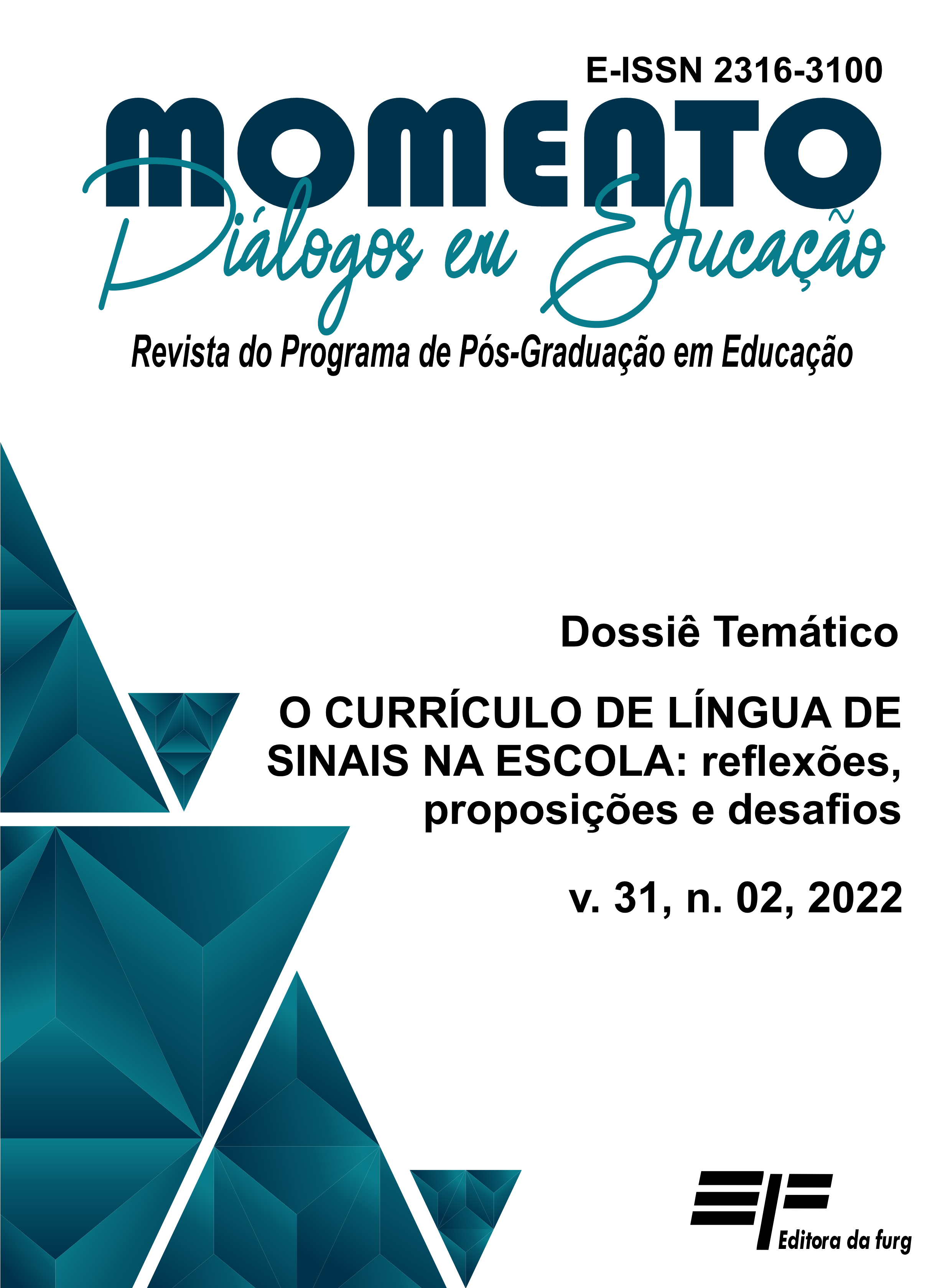SINAL E ESCOLA
uma jornada
DOI:
https://doi.org/10.14295/momento.v31i02.14259Palavras-chave:
Língua de Sinais na Escola, Bilinguismo de sinais, TransumanismoResumo
Quando nossa coletânea internacional de artigos sobre o status da sinalização na escola foi publicada em 1987, acreditávamos que estávamos em transição no Reino Unido. A descoberta das línguas de sinais e sua validação pelos linguistas, forneceram a base para a implementação que a comunidade surda havia solicitado. As crianças surdas devem ter a língua de sinais como sua língua de interação e instrução. A coletânea destacou os pensamentos de vanguarda, mas também mostrou que diferentes países estavam em diferentes estágios de sua jornada. Nesta contribuição, refletimos sobre o conhecimento que tínhamos na época, as descobertas desde então e questionamos: a norma atual é que as crianças surdas, desde a mais tenra idade, tenham acesso à língua de sinais (no nosso caso, a Língua de Sinais Britânica), e podemos descrevemos as evidências que dizem que isso está funcionando para produzir cidadãos mais ajustados e eficazes? Olhamos além da simples questão para considerar se o bilinguismo que temos defendido é unilateral e não produz uma mudança de atitude para a maioria da sociedade. Com efeito, se os surdos se tornam bilíngues, isso permite que a sociedade permaneça monolíngue e evite o envolvimento com a visão surda de vida e de sociedade? E, finalmente, o artigo pergunta o que será a perda auditiva ou o aprimoramento auditivo no futuro?
Downloads
Referências
Arnot, N. The History of Edinburgh. Edinburgh: Creech, 1779.
BAKER, C. Foundations of Bilingual Education and Bilingualism, 5th edition Bristol: Multilingual Matters, 2011.
Bergman, B. Signed Swedish. Rosenludstrychunit: National Swedish Board of Education, 1979.
Bodner-Johnson, B.; Benedict, B.S. Bilingual deaf and hearing families: Narrative interviews. Washington, D.C.: Gallaudet University Press, 2012.
Bouvet, D. Sign Language and the Education of the Deaf Child. In: Kyle, J. Sign and School. 54-60, Clevedon: Multilingual Matters, 1987.
British Sign Language (Scotland) Act 2015,
https://www.legislation.gov.uk/asp/2015/11/contents
Consortium for Researching Deaf Education, 2019 UK-wide summary: CRIDE report on 2018/2019 survey on educational provision for deaf children. Available at: <https://www.ndcs.org.uk/media/6550/cride-2019-uk-wide-report-final.pdf>. Retrieved: 20-10-2021.
Deck, C. Bilingual Education for Deaf Children in France. In: Kyle, J. Sign and School, 198-205, Clevedon: Multilingual Matters, 1987.
Denton, D. The Total Communication Revolution. In: Kyle, J. Sign and School, 75-80, Clevedon: Multilingual Matters, 1987.
Gregory, S. Sign language and the education of deaf pupils, British Association of the Teachers of the Deaf, 2017. Online paper available at: <https://www.batod.org.uk/information/sign-language-and-the-education-of-deaf-pupils/>. Retrieved: 20-10-2021.
Hansen, B. Sign language and Bilingualism. In: Kyle, J. Sign and School, 81-88, Clevedon: Multilingual Matters, 1987.
Harder, R.; Knoors, H. Consolidation of Method or Future Changes? In: Kyle, J. Sign and School, 109-119, Clevedon: Multilingual Matters, 1987.
Kusters, A.; De Muelder, M.; O’Brien, D. Innovations in Deaf Studies. Oxford: Oxford University Press, 2017.
Kyle, J. G. (Ed.). Sign and School. Clevedon: Multilingual Matters, 1987.
Kyle, J.G.; Ladd, P. Deaf Education and the Status of Deaf People in the UK. In: Moores, D.F.; Miller, M.S. (Eds.) Deaf People around the World. 245-268, Washington, D.C.: Gallaudet University Press, 2009.
Kyle, J.G. He’s just not normal: services, families and Deaf identity. In: Leeson, L.; Vermeerbergen, M. (Eds.), Working with the Deaf Community: Deaf Education, Mental Health & Interpreting. Dublin: Inter Resource Group Publishing, 2013.
LADD P. Understanding Deaf Culture: in search of Deafhood, Clevedon: Multilingual matters, 2003
Lee J. Cochlear Implantation, Enhancements, Transhumanism and Posthumanism: Some Human, Questions Sci Eng Ethics,v. 22, p. 67–92, 2016.
Marchesi, A. Sign Language in the Education of the Deaf in Spain, In: Kyle, J. (Ed.), Sign and School. 143-152, Clevedon: Multilingual Matters, 1987.
Mauldin, L. Made to hear. Minneapolis, MN: University of Minnesota Press, 2016.
Maye, C.; Ringli, G.; Boyes-Braem, P, The Use of Signs in Switzerland. In: Kyle, J. (Ed.), Sign and School. 162-170, Clevedon: Multilingual Matters, 1987.
Moores, D.F.; Miller, M.S. (Eds.), Deaf People around the World: Educational and Social Perspectives. Washington, D.C.: Gallaudet University Press, 2009.
Preisler, G. The situation of the Deaf in Sweden. In: Moores, D.F.; Miller, M.S. (Eds.), Deaf People around the World: Educational and Social Perspectives, 231-244, Washington, D.C.: Gallaudet University Press, 2009.
Prillwitz, S. Is the time of the ‘German Method’ over in Germany? In: Kyle, J. (Ed.), Sign and School. 89-99, Clevedon: Multilingual Matters, 1987.
Salamanca Statement on Principles, Policy and Practice in Special Needs Education, UNESCO, ED-9 4/ W S/1 8, 2014. Available at: < https://www.right-to-education.org/sites/right-to-education.org/files/resource-attachments/Salamanca_Statement_1994.pdf>. Retrieved: 20-10-2021.
Scott, W.R. The Deaf and Dumb. London: Bell & Daldy, 1870.
Skliar, C.; Quadros, M.R. Bilingual deaf education in the south of Brazil. International Journal of Bilingual Education and Bilingualism, v.7, n.5, p. 368-380, 2004.
Skutnabb-Kangas, T. Linguistic Human Rights: a Prerequisite for Bilingualism. In: Ahlgren, I.; Hyltenstam, K. (Eds.), Bilingualism in Deaf Education, International Studies on Sign Language and Communication of the Deaf, Vol. 27. Hamburg: Signum, 1994, p. 139-159.
Tylor, E.B. Researches into the Early History of Mankind. London: Murray, 1874.
Van der Lem, T. An Early Intervention Programme. In: Kyle, J. (Ed.), Sign and School. 155-161, Clevedon: Multilingual Matters, 1987.
Watson, J. Instruction of the Deaf and Dumb. London: Darton & Harvey, 1809.
Weber, J.C. Becoming Deaf in the Postman Era. Unpublished PhD Dissertation, Regina Saskatchewan: University of Regina, 2018.
Zaitseva, G.L. Problems of Sign Language in Soviet Deaf E. In: Kyle, J. (Ed.), Sign and School. 100-108, Clevedon: Multilingual Matters, 1987.
Downloads
Publicado
Como Citar
Edição
Seção
Licença
Copyright (c) 2022 Momento - Diálogos em Educação

Este trabalho está licenciado sob uma licença Creative Commons Attribution 4.0 International License.
À Revista Momento − Diálogos em Educação, ficam reservados os direitos autorais, de todos os artigos nela publicados.


